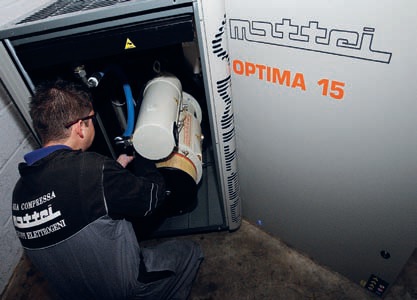

|
Edward Lowton
Editor |


|
| Home> | Handbooks | >Maintenance Management Guide | >Compressor maintenance for efficiency and safety |
ARTICLE
Compressor maintenance for efficiency and safety
18 June 2014
Andy Jones, general manager at Mattei, explains why regular servicing and maintenance is essential to ensure compressors are operating efficiently and safely.

We cannot stress how important it is for compressors and associated air treatment equipment to be properly serviced, maintained and inspected.
Compressors should be serviced at intervals specified by the equipment manufacturer, but guidelines and timescales for legally required inspections are provided through a document called a Written Scheme of Examination. This specifies the parts of the system that need to be examined, the nature of the examination required, the preparatory work needed and the maximum interval allowed between examinations.
Virtually without exception, every compressed air system must have a Written Scheme of Examination. It is a legal requirement under the Pressure Systems Safety Regulations 2000, but many businesses operating compressed air systems either ignore this important responsibility, or are simply not aware of it.
If they haven’t done so already, we would advise factory and plant managers responsible for compressed air systems to familiarise themselves with the regulation, and, if not already available, to have an official Written Scheme of Examination drawn up as a matter of urgency.
There is a potential fine of up to £20,000 for not having the document in place.
And, what’s more, compressed air systems that aren’t maintained and serviced correctly will not run efficiently, ultimately increasing running costs and carbon emissions. They could also end up posing a danger, and in very extreme cases might even catch fire or explode.
When choosing a maintenance contractor, there are some voluntary schemes that end users can look out for.
Companies working in the compressed air industry can demonstrate their professionalism and competence as well as their commitment to health and safety and best practice by joining BCAS (British Compressed Air Society). Membership is by peer review and members have to adhere to its codes of conduct. Members can also choose to proactively participate in the BCAS AirSAFE register, which promotes the credibility and professionalism of BCAS members as identified via customer feedback.
As part of a preventative maintenance regime, additional checks should also be carried out on compressor oil levels as well as any intake filters and coolers to ensure they remain free of blockages and to avoid overheating. We’d advise asking the service provider if they are using genuine parts and oil; if not performance and reliability could be reduced.
It’s also important to carry out regular checks on the system pipework to identify leaks, rust and corrosion, which can all adversely affect system efficiency and safety.
When choosing a new compressor, it’s worth considering how much maintenance will be involved. Providing that a vane compressor is looked after in accordance with the manufacturer’s instructions, the operating life of its air end can easily extend to over 100,000 hours without wear – in fact, some vane machines have lasted over 200,000 hours in arduous, dusty operating conditions.
Mattei offers a variety of service and maintenance packages for most makes of compressor and can offer assistance if a Written Scheme of Examination needs to be produced.
We provide a free of charge, 10-year (unlimited hours) air end warranty on our own range of reliable and efficient rotary vane compressors, which only requires compliance to standard servicing, rather than onerous maintenance regimes often required by others.
Mattei is committed to improving health and safety practices in the compressed air industry. We are a member of BCAS and have SAFEcontractor accreditation and an AirSAFE award.
MORE FROM THIS COMPANY
- Air compressors and global warming
- Project of the year award winner
- Advice on loans
- Tips for an energy efficient compressed air system
- Pay attention to pipework
- The changing face of compressed air specification
- Compressors: Finding the true life cycle cost
- Compressor safety: Concerns aired
- Compessed air systems: Efficiency matters
- Compressed air: Opportunities for savings
RELATED ARTICLES
- Healthy trucks, healthy site
- The Sound of Silence: Communicating with machines
- Inspection, test & monitoring: A choice of career development pathways
- Compressor efficiency: Specification matters
- Raising issues of concern
- Mattei explains why compressor maintenance is essential
- Maintec 2013: Innovation galore
- Co-Locations for Maintec 2014
- Maintaining strategies for success
- Considerations for machine tool maintenance
OTHER ARTICLES IN THIS SECTION

















